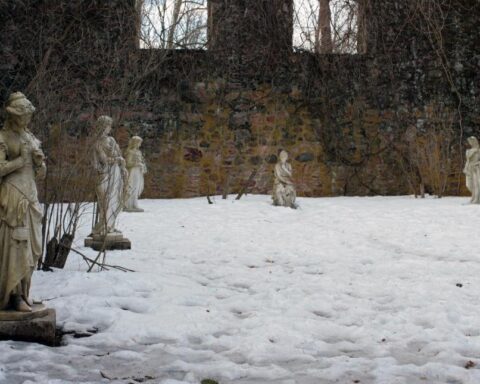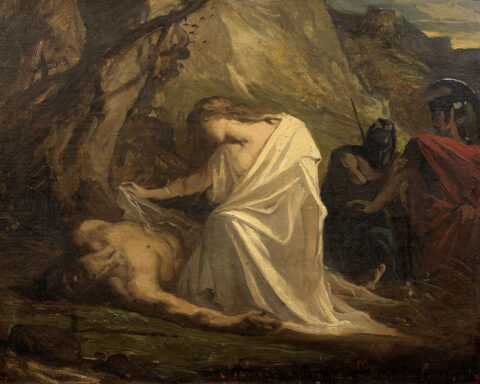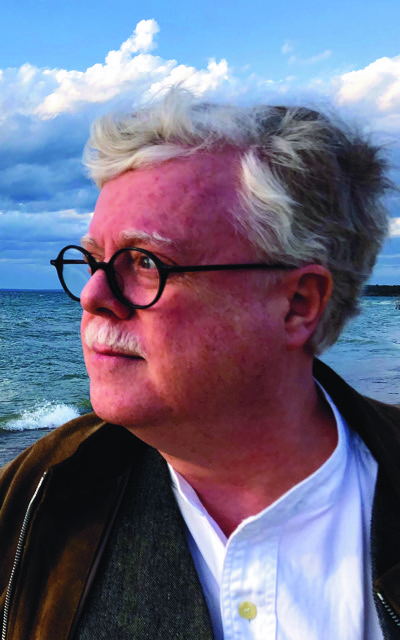
Bruce Meyer describes himself as one of Canadian literature’s best kept secrets. As a poet, author, editor, interviewer and portrait photographer, Bruce is responsible for sixty-four books — including an international bestseller — with many more on the way, but he has weathered so many publishing setbacks his story will serve as an inspiration to any writer struggling to get that first acceptance.
Merely scratching the surface of his life reveals the legendary Northrop Frye served as Bruce’s mentor; Bruce taught with Alistair MacLeod and interviewed Leonard Cohen; he created what was at the time the largest creative writing program in Canada and was a contributor for the Oxford Companion to Canadian Literature; Margaret Atwood wrote the “Afterword” for the collection of World War I poetry and prose Bruce co-edited; Bruce counts George Elliot Clarke, Anne Michaels and many other literary icons as friends; he was the inaugural poet laureate of Barrie, Ontario; and his radio broadcasts with Michael Enright on CBC’s This Morning were recorded to become the network’s largest selling series.
But even more interesting are the miracles that have graced his life. Bruce survived an accidental dairy poisoning in 1960 which left dozens dead; the same doctor who treated Bruce later tore up the death certificate of Bruce’s infant daughter when her heart miraculously snapped into rhythm upon hearing her father’s voice.
Bruce’s positive attitude is infectious, his knowledge is extensive, and I can’t wait to introduce you to a man who imagined his own future and realized it by following his singular love of words. As you’ll see from the following highlights of our correspondence, conducted over the recent Canadian Thanksgiving weekend, Bruce has overcome adversity to become the virtual embodiment of — not only Canadian literature — but the whole of Western literature.
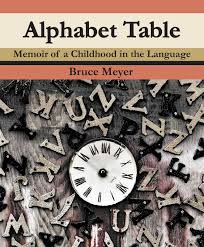
You started writing at a very early age. How did this come about?
I taught myself to read and write at three. I wanted to know things. My mother came home from shopping at Honest Ed’s one day with a folding tray table so I could eat my dinner in the kitchen while she cooked for herself and my dad. I still have the table top. It had numbers along the bottom rim and the alphabet along the top and circus animals in the middle. She told me how each letter sounded and I took things from there. I tell this story in “Alphabet Table,” a memoir I published in 2010 [Black Moss Press]. By the time I got to kindergarten I was writing stories and poems.
Reading and writing are the most fundamental forms of independence. When I learned to read I no longer felt helpless. I earned a PhD and a Certificate of Post-Doctoral Studies in English. I love language. I love the sense of verbal architecture in words and ideas. Milton’s Paradise Lost is like walking in a cathedral. My home library has over 24,000 books. I read at least two books of poetry a day or a book of short stories every two days. I never go anywhere without a book. That has been the case my entire life.
“Writing is an addiction and not writing is a form of living hell.”
I’m also never without my Moleskine notebook, my trusty leather satchel, and a pocket full of fountain pens (in case one runs out, I just go to the next pen). Everything speaks to me and I love to listen to the world and write down what it has to say.
I write at least two poems or a short story per day. I type 100 words per minute and can sit down and write a ten page story in under an hour and before I set pen to paper or begin to type, I’ve seen the finished product in my mind. I know where the piece is going and am curious, on the redraft, about things I can do to make getting to the point of arrival more engaging and interesting, at least to me. My friends are all writers and they know that writing is an addiction and not writing is a form of living hell.
Yours was a long path to publication, including more than a hundred rejections for your first manuscript, plus two books were accepted but never published. Many writing careers wouldn’t survive such an experience. During that pre-publication era, how did you stay positive, focused, and gather the will to keep submitting?
Small correction. My first book was rejected 1000 times. If a writer dares to do something different, he or she is going to experience that. I kept a box with the rejection letters. My mother threw it out. For years I carried a quote by Thelonious Monk in my wallet. Monk said, “Play your own way. You play what you want, and let the public pick up on what you were doing, even if it takes fifteen, twenty years.”
Never write like anyone else. Write like yourself. Pay the price, and await the outcome. Copying other people is not art. It is manufacturing. I don’t write like other people. I never have and never will. I write like Bruce Meyer, even if Bruce Meyer is the only person who gets it.
“Never write like anyone else. Write like yourself.”
As to my publishing history, you are correct. I’ve had lost books, but I’ve also published 64 books. My advice to other writers when things go badly is “just write the next one.” This philosophy of keep on keeping on is about the only way to stay sane if a person believes in their art. That said, art is about constantly learning to do something new. I never write the same poem twice. I never write the same story twice.
Writing is like my relationship with my wife. Every morning I ask, “What’s new?” Always look for something new. Most of the time the newest place is in a writer’s deepest memory. What is old gives life to the future. Also, the novelist Brian Moore told me years ago, “A writer must be ruthless.” No experience should be wasted on a writer if he or she is paying attention and listening to the world around them.
Do you have advice for struggling writers trying to get that first book, story or poem published?
For fear of sounding like Knute Rockne or Winston Churchill, in a nutshell my advice is “Fight, fight. Never surrender.” If you decide to write, you are committing yourself to a long, hard road. Barry Callaghan always says it is better to be “a complete catastrophe than a false success.” Jack Gilbert, the American poet, has a line I love in his poem, “The Abnormal Is Not Courage:” “It is the normal excellence, of long accomplishment.”
“A writer must, above all, honour the language by giving it not merely pizzazz in the moment… but the longevity of constant exploration.”
I have seen dozens and dozens of one hit wonders, writers who were of the moment. When the moment ended they faded away. A writer must embrace all the art, must learn everything he or she can about the art they practice. A writer must, above all, honour the language by giving it not merely pizzazz in the moment, or what my friend Dana Gioia calls “Poe-biz,” but the longevity of constant exploration. Seamus Heaney was a kind of mentor to me. When my first book of poems appeared he wrote me a wonderful fan letter. I look at his work, and at the work of another Nobel Laureate, Derek Walcott, who I got to know fairly well when he was in Toronto. They speak not to the moment but to the human experience in ways and in subjects that never change. Neruda, one of my favourite poets, had a long career because he saw poetry as what they call in business strategy “the long game.” I don’t know what the future will be like, but I know people will be concerned with love, family, moments of sublime surprise and discovery, and loss.
We all know writing requires stamina but is there any special fortitude required to cope with the highs and lows of the publication process?
Someone asked Walter de la Mare what his best poem was, and after leafing through about a hundred pieces of his own work he apologized and said, “Sorry, I haven’t written it yet.”
A writer is only as good as his next poem or story or his next sentence or next word. The desire to do something better, to sit down at a desk every day or grasp a notebook and dig deeper and deeper into one’s soul is a rough ride. Dexter Gordon in “Round Midnight,” has a great speech to that effect about standing up and playing the saxophone night after night and always looking for something better. It can tear a person’s soul apart.
What mitigates the pain is constant reading, constant studying, reading to see what others have done and to do something new, not like them, but doing something new with the understanding that your work must be original. One of the best things a writer can do is not engage in what other writers say but how they say it. Li-Young Lee and Seamus Heaney have structures within their works that, at least at this time, I am studying because I am fascinated by how they did something. The first time I read Philip Larkin, on a bus from Toronto to Hamilton, my reaction was, “How did he do that?” Mary Jo Salter evoked the same response from me. I told her that when I met her and she said that was the nicest thing anyone ever said to her.
Writing is not about what. Anyone can fill a shopping bag with what. Writing is about how. That’s where the art resides.
Can you tell us more about the art of making a book and why you feel the satisfaction of this process transcends financial reward?
There’s an old maxim every writer should know: don’t quit your day job. I love teaching. I love seeing the lights come on in students’ eyes when they understand what a sentence or a paragraph can do. Never write for money. Writers who write for money, and I know many, will want to murder me for saying that. I write for the art. I am very lucky that my day job, a teaching gig at Georgian College and sometimes at my old alma mater, Victoria College, provide me with intense periods of heavy brain activity (teaching and marking) followed by long lulls in which I can shift gears and let my mind go in an entirely different direction. That is the ideal situation for a writer.
“I write for the art.”
If you look at the writers of the First World War, there were intense periods of battle and the fight for survival, followed by long runs of empty time. Earle Birney, who had been a soldier, tipped me off to this as the ideal writing life. I get my best ideas in the shower in the morning. I walk around with them in the back of my mind all day. At night, when the house is quiet and everyone is asleep, I sit and write into the small hours. Peace. Tranquility. And above all, the chance to hear myself. That’s when I lose myself in words.
I tell writers several things. First, you don’t need an agent. If you have a good agent, bravo. If your agent fails you, as one did to me, they are more trouble than they are worth. Magazines and zines are wonderful testing grounds for new work. I see them as my beta test zones. The real purpose of writing, however, is the book. The book lasts. Horace, the Latin poet, has a great phrase, “Litera scripta manet.” The written word survives.
As for setbacks? Everyone has setbacks. The word ‘setback’ should be read as something that is set in the past. It has happened. Get over it. Go write the next one. Don’t fret about the crap that happens and don’t live in it. It is filthy there. Write the next one, and if the first 999 presses reject it, all you need is that one publisher who believes in you, and you’re back in the game. That publisher for me was Marty Gervais. I love the guy. He’s saved my life numerous times, not just my publishing life, but my actual physical life. He is a great soul. Ditto for Barry Callaghan and Michael Mirolla. I owe them big time. A book on a shelf doesn’t speak in dollar signs. It speaks through the words on the page. That’s all that matters. Making tons of money will buy stuff, but stuff wears out after a while. Words, if used artfully and with wonder, never lose their value and never wear out. Look after the words.
Is mentorship possible between writers whose only connection is social media? Can an online community be effective in fostering literary mentorship?
Yes. I once attended a workshop, the only workshop I’ve ever attended, with the poet Alfred Corn. I’m still in touch with him. He had a lot of wonderful ideas, and he gave me very useful feedback just as I was preparing the early book, The Presence [Black Moss Press, 1999]. I said, “How can I thank you?” And he said, pay it forward. Help the next writer. Pass it on.
The worst advice I ever received was from a Canadian poet/children’s writer who said I should write like a certain writer he admired. That’s horrible advice. I scold my students if they try to write like me. They have to write like themselves. The challenge is finding a voice.
I said, ‘How can I thank you?’ And he said, pay it forward. Help the next writer. Pass it on.”
How does one find a voice? Well, read everything you can lay your hands on. Then read more. Go in search of books. Study them. Then, after an accumulation of literary experience, toss it all out, unlearn everything you’ve learned, and refuse to write like any of them. Write what you felt you wanted to read when you went reading and couldn’t find exactly what you wanted to see.
James Wright spent the first half of his career, for instance, learning form. Then he spent the second half of his life unlearning. There’s a kind of negative capability a writer must engage, a desire to break the matrix and the commonality of voice and form when everyone else is doing the same thing.
Paul Romero who used to run the reading series in Bryant Park in New York (and New York Fashion Week) commented (and I wasn’t sure if it was a compliment or not) after I read with several other Canadian poets, he declared they all had “that unique Canadian voice,” all except me. I asked him what he meant as we lunched at the Pavilion. He wasn’t sure. He hadn’t heard anyone like me. He changed the subject when I pressed him on the matter. Never sound like someone else.
A good mentor will ask his or her students to dig deep within themselves, plug their ears, and to write what they are aware hasn’t been written. And the proviso on the question of how is that learning how doesn’t mean imitation. It means exploration, the need to extend or reinvent what has already been invented, but to never forget that on the other end of the words there is a reader. Never forget the reader. It is a writer’s obligation to include them in what is said. Too much contemporary writing excludes the reader and at that point the writer becomes a solipsist.
How important are online journals in today’s publishing world? Can publishing in an online journal play a role in getting a traditional publisher to accept a manuscript?
They are just like any other printed medium. It is the words that are important. That said, I still love paper. Paper grew. It is something that lived and breathed in the way a writer lives and breathes. Paper, books, are still very important. We’re just one large sun spot or magnetic flare away from reverting to the analog age. I keep paper copies of everything as well as electronic files. And remember, when you zip through the pages of a book and hold it to your ear, you can still hear the wind blowing through the leaves on a summer night before it rains.
Have you ever had a poem become a short story, or vice versa?
No. I usually know before I even reach for my notebook or my laptop that what I am going to write will be in a particular genre. That’s not to say I don’t try working the idea through five ways from Sunday in my brain. As I said, I see the whole piece before I begin to write it. That way I can listen for nuances in language, look for access points to expand an idea, wait for moments when I can exercise brevity. The form means something. Form is an extra layer of meaning. Even short stories have forms. What was it Emily Dickinson said about “a formal feeling comes?” [“After great pain, a formal feeling comes” Emily Dickinson, 1862] The subject should tell the writer what kind of writing it wants to live in. Subjects choose their real estate.
Sometimes I experiment but no one sees the experiments. I only release the finished products. Too many writers have been ruined after the fact by editors who want to publish everything. That’s a no-no. Part of writing is the art of being selective, and that selectivity starts with the decision for the genre.
I think a writer knows when to tell a story and when to write a poem. That said, I’ve have poems where the subject matter has insisted on being narrative the more I walked around in the vision in my head. My poem that won the MacEwen Prize a few years ago, “The Harmony,” is one such poem [2017, Gwendolyn MacEwen Poetry Competition]. The more I stood in the poem, the more I saw until the finished piece was rich in images. It would not have worked as a story. The woman in the poem was long dead. It would have been campy as a ghost story. But as a poem it worked because I was walking around in her world as if it still existed. I love looking at pictures of abandoned houses on Facebook. They are sad, but they also reveal so many ideas.
Do you have a writing routine? What does your writing space look like?
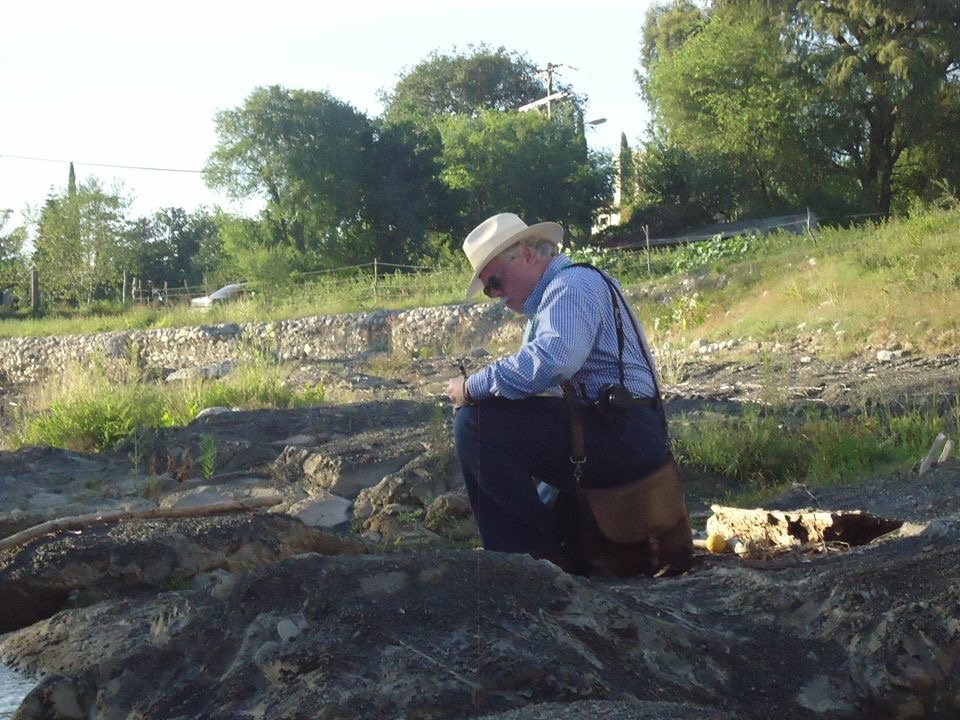
There’s a couple of questions in that. I don’t have a writing routine, per se. I have constant access. I carry a Moleskine notebook everywhere — to the grocery story, to classes, to the barber shop…literally everywhere — in a leather cowboy satchel. The bag and I are inseparable. I’ve had it for more than fifteen years. It goes where I go. I sleep with a lap desk and my notebooks beside my bed. If an idea comes, I suppose the only routine I practice is that I write it down immediately. If an idea strikes in the middle of a class I scribble a quick one or two word note on my class file folder and expand on the idea when I get home.
What does my writing space look like? It is a heavenly mess, but it depends where I am. My friend, the Irish Canadian poet, Colin Carberry, snapped a picture of me sitting on a rock in the middle of a river in Mexico near Hualahuises with my notebook open and me writing. At home, when I am working on a short story, I’m usually at my desk in my study. Poetry happens anywhere; prose happens at my desk.
I type 100 words per minute and that’s good for prose. Poetry gets its first, second, and often later drafts in fountain pen (all neatly numbered, dated, and ordered in my notebooks — if I didn’t keep track things would get all shuffled and I wouldn’t see what was a wrong direction or a good turn in the road.
My study contains 24,000 books, in sections, and in an order I can find things. No one else knows the order, but I keep a timeline in my head and can see the spectrum of literary development and evolution as a kind of measuring stick, like an old-fashioned wooden school ruler, and each era seated on the scale. My desk is an orderly mess of notes, but the amazing thing is that I can find my way through the notes.
How important is flash fiction as a literary form?
I was spooked by fiction for years. In first year university, I started writing stories. An older student I looked up to told me they were trash and needed a lot of work. Other people always spoke of “the craft of fiction” as if it was some sort of mystical, Masonic code. It is not. Simply put, you tell a story and you keep track of details.
Poetry is far more complex because it requires a different part of the brain — the part of the brain that thinks of a million things happening at once, as Elizabeth Bishop put it. Anne Michaels, a good friend (I published her first poems in a student literary magazine I was editing) once asked me over lunch what the difference was, for me, between poetry and prose because she does both so incredibly well. I thought about it. Stories require that one keeps track of linear logic, of the details, of writing within a very tight budget of words. Poetry, on the other hand, requires imagistic logic, broad connections, sometimes links and leaps that would seem illogical or impossible but are the gold standard of poetry — surprise, not just the twists and turns of plot.
I came to flash fiction when I decided, in earnest, to start writing short stories about ten years ago. I thought, who were those guys in university and what did they know? Nothing, as far as I could see, yet they put me off my calling. To write poems (and I am paraphrasing Keats) one should write prose and to write prose one should learn to write poetry. Seems fair. One trains the other in terms of what each discipline requires.
I woke up in the ambulance with head, neck, and back injuries, and a very addled brain. I couldn’t read for almost four months… I needed a discipline that would enable me to hone and control language. That’s when I returned to writing flash fiction.”
Then, in November 2016, I was in a car accident. We were broadsided about four blocks from our house, on my side, the passenger side. I don’t drive. I woke up in the ambulance with head, neck, and back injuries, and a very addled brain. I couldn’t read for almost four months. I had students read PowerPoint slides out loud in class so I could comment on them. For a teacher of writing and literature, that was a terrible experience. For three months I could not recall the name for the inside of a fountain pen — a reservoir. It was a nightmare. As the words returned, I needed a discipline that would enable me to hone and control language. That’s when I returned to writing flash fiction. Then, I started reading flash fiction. I love the idea of writing to length, of keeping ideas and language under control.
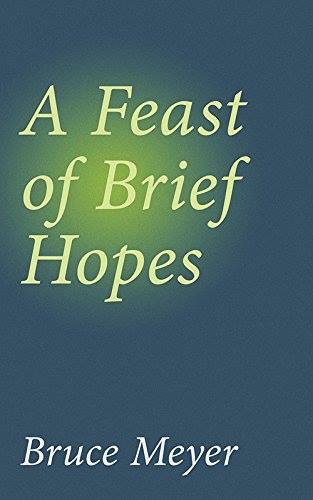
When I was a graduate student, I paid my way to several months of research in England by being the clean-up man on the Oxford Companion to Canadian Literature. Each Friday afternoon around four p.m., Bill Toye, the editor, would hand me a list of articles all in the same letter of the alphabetical companion, and I would run down to Robarts Library, research the author or the topic, usually call the subject if he or she was alive to check my facts, write up the articles on the Sunday, and have them to Toye by Monday morning. Each article had to be a precise length. I was the contributor with the most entries to the 1983 edition. I was writing flash non-fiction though I didn’t know it.
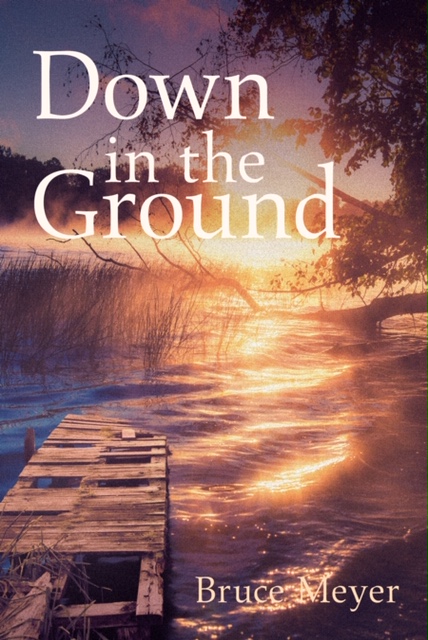
I love flash because there are subjects that would just become watery and bland if I pushed them further than two hundred or five hundred words. It is better to say less than to say too much. There are other subjects and themes that lend themselves to extended stories. Down in the Ground, a book of flash stories of mine will appear next year [Guernica Editions]. Compare those to stories in A Feast of Brief Hopes which are longer stories [Guernica Editions, 2018].
In your story, “The Adoration,” you describe the experience of a dying woman healed after attending a Charlie Parker concert at Massey Hall, on the night of Hurricane Hazel. Does art have the power to heal?
I was sent home to die when I was three years old.
That is the story of someone I know. She was written off. She went into the hospital to die and prayed every day at a church nearby and was miraculously cured. This is going to sound strange, but I believe in miracles because I have experienced three in my life. The first miracle was that I was sent home to die, when I was three years old, by the Sick Kids Hospital in Toronto. A doctor, not my own but a young fill-in, sat up with me all night. A dairy had poisoned about a hundred children with severe gastroenteritis. About thirty or forty kids died. I lived. That was miracle number one.
Miracle number two is described in my short story, “Something Close to Brilliance, Something Close to Love” in A Chronicle of Magpies [Tightrope Books, 2015]. My daughter was given up for dead when she was born. I sang “Somewhere Over the Rainbow” to her in the neo-natal intensive care ward at St. Michael’s Hospital, just as I had sung every night into my wife’s belly — same song. My daughter’s heart immediately snapped into proper rhythm. The doctor who was writing her death certificate in a corner of the ward checked her over and tore up the paper. He said he wouldn’t go out on a losing note as my daughter was the last patient he was seeing before he was set to retire in an hour. The doctor was the one who sat up with me the night I was supposed to die at the age of three.
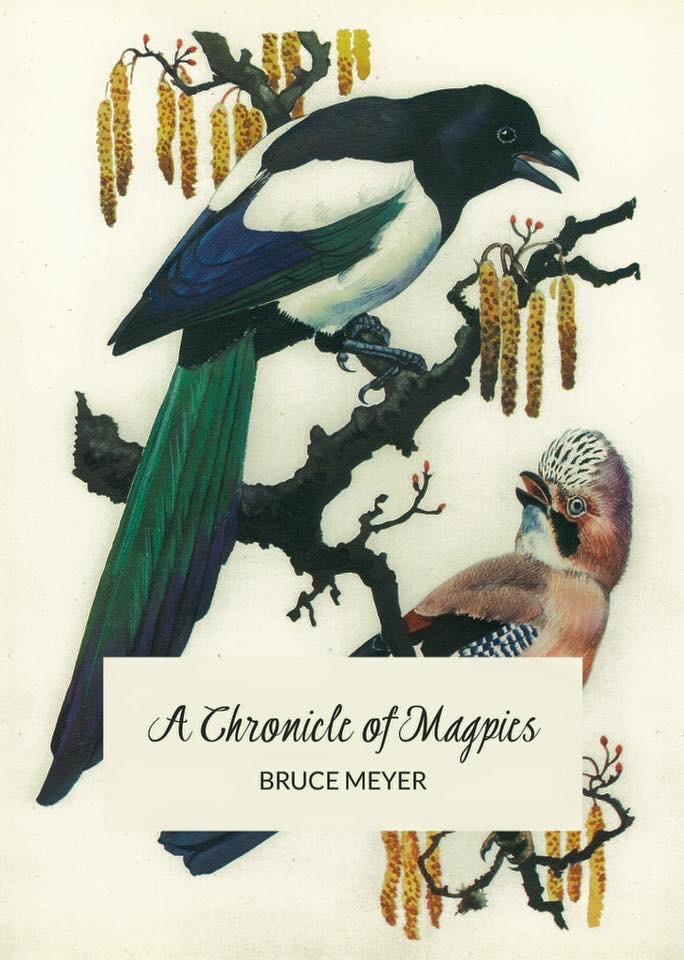
Then, I went deaf. My sister prayed for me in Knock Cathedral, lit a candle. I recovered my hearing. Several years before when I thought I’d never be married and find my soul mate, my sister carried a stone up Knocknarea in Ireland and laid it on Maeve’s cairn, as legend suggests. Sure enough, about a month later, I met my wife.
There are unseen forces at work in the world. When I was eight, I wrote an essay in which I said I was going to become a professor of English and teach at Victoria College, which I did. My Grade Six teacher predicted I would write many books. I have. My Grade Thirteen English teacher said I would go far in English studies. I have a PhD and a Certificate of Post-Doctoral Studies and a national bestseller on how literature works, The Golden Thread [Harper Collins, 2000]. I dreamed, during a very dark time in my life, that I would meet the love of my life and we would live in a community with big trees and Georgian houses. I teach at Georgian College and my street is lined with tall oaks and pines. Coincidence?
The doctor who was writing her death certificate in the corner of the ward checked her out and tore up the paper.”
I think we all have an inkling, if we listen to ourselves, of who and what we will become, and if we are willing to trust the universe we are gradually moved toward it. The Romans called it destiny. I call it inevitability. My students worry about what they will become. A person shouldn’t plan on becoming something. A person should follow what they love, their “bliss” as James Campbell called it (I met Campbell once at a gathering in Toronto), and let things roll from there.
I could not have predicted I would teach a Great Books course, or that the course would be written up in Toronto Life, or that the write-up would lead to a series of broadcasts, or that the broadcasts would lead to sixty hours of CDs with Michael Enright on the CBC and a national bestseller. You can’t plan on anything. You can only prepare yourself and let it roll.
The universe wants to draw your attention to things that you should notice, and if you are paying attention to what the universe says (and quite often the universe is not encouraging so never mistake immediate negative outcomes with the long-term scope of things) and listening to your heart, things will take you in directions you never dreamed possible. The worst luck is actually the best luck in disguise. Life keeps telling me that, or as the Rolling Stones said, “you can’t always get what you want…”
You recently won the 2019 Anton Chekhov Award for Very Short Fiction with a story called Urineworts, about a porcupine that some boys accidentally drown in a ditch. [] What can you tell me about the origin of this piece?
My wife grew up in Elliot Lake. Those who know the community know it has a town centre surrounded by various minehead subcommunities. Most of those minehead communities are now levelled and have gone back to nature. Our late friend and accountant came from the place I describe in the story. The line about living in summer camp was something my mother-in-law said to my wife when she was a child. Growing up in such place, one is very close to nature. I grew up in a suburb of Toronto, so I have always taken a keen interest in places that are different from my own experience. I am still mining my own experience (no pun intended).
In 2017 you edited a book called: “CLI-FI: Canadian Tales of Climate Change” [Exile Editions]. In the introduction you wrote: “I am relying on authors not only to warn, but to seek imaginable and real solutions to the damaged air, the melting ice caps, and the rising seas.” This is a big job for fiction but one more and more authors are undertaking. Are they having an effect? Have you been able to identify specific solutions to the climate crisis that have arisen from literature?
I am relying on authors not only to warn, but to seek imaginable and real solutions to the damaged air, the melting ice caps, and the rising seas.”
I find it odd that climate change is now a big issue. I fought to bring people’s attention to it. When I was preparing the book, a handful of very brave authors stepped forward — Kate Story, Nina Munteanu — authors with tremendous talent and sublime conviction to speak about the impending crisis. I asked the current Liberal Minister of the Environment to write a foreword for the book and even after repeated requests got the standard “go away letter” from her office staff.
Steve Paikin on TV Ontario’s The Agenda, someone I have known and respected — and who has been a friend of my wife (she was his writer at CBC) and I for many years — saw the book and had me on his show. He understands the gravity of the situation the world is facing. Fiction is the first beachhead of any challenge to the darker side of our perceptions. Atwood threw out the challenge when she came to Barrie. Everyone applauded but no one did anything. I did. I decided to take on climate change, to do something about it, even if it was only to trigger our imaginations and our conversations about the topic because I could see what was happening. Greta Thunberg has taken the conversation to a whole new level, but planting the topic in the news cycle means the story will one day fade. News cycles eventually lead to other things. Today’s headlines are tomorrow’s fish and chips wrappings.
It is still my assertion, and the assertion of writers such as Nina Munteanu, for example, that the way to keep a profound warning current is to make sure it becomes part of our imaginative fabric. When we imagine a new way of talking about our inner experience, not just our outer experience, say like flash fiction, it evolves into a genre. Genres are practiced and re-practiced, honed, refined, and they, in turn, raise new conversations.
I have planted a seed that won’t end with marches or speeches.”
Imagination is the key to unlocking our problem-solving abilities, and I know I have planted a seed that won’t end with marches or speeches — they are good in their moments — but something that reminds us of the terrible horror we are capable of wreaking on the world and also capable of remedying through the power of creative thinking. Poetry and literature change people’s minds. Just ask Julia Ward Howe or Harriet Tubman.
Your story “The Socratic Method,” is now online at the Blake-Jones Review. There’s a lot here: dance, philosophy, quail hunting, mating rituals of Peacock Spiders, etc. What inspired this story?
I was thinking about reinventing the idea of the femme fatale, Le Belle Dame Sans Merci, the Circe legend. I started researching dance and came across the dancing spiders.
Everything in that story is absolutely plausible. I love working with facts within the context of fiction. My book of baseball stories, Goodbye Mr. Spalding, [Black Moss Press, 1996] is almost entirely factual fiction. Other stories such as “The Slithy Toves” about Lewis Carroll are factual fiction. I think facts give fiction a life that fiction alone might not possess; and by that I mean the realm of the imagination is built upon the foundation of our knowledge and that knowledge, epistemologically speaking, is a story in and of itself.
I see ideas as narratives waiting to leap to life because an idea becomes so much more if it is a basis for a story. I think that’s a core idea in literature. Homer’s works were all factual, within the scope of his ability to gather and narrate what he knew. In A Feast of Brief Hopes [Guernica Editions, 2018] I have a story about a Cyclops child. I’ve actually held one in the anatomy lab at McMaster University. They are real. Nothing is fantastic once it is attached to what we know; but when it is attached it becomes more real, more vivid as a story because it is true. Just ask the blind storyteller from Chios. He’ll agree with me.
In your book The Golden Thread, you wrote “The Bible is a school for writers” and I can’t help but see an Adam and Eve figure in “The Socratic Method.” There’s also a garden – actually a meadow – and the woman introduces the man to evil. Are these conscious elements in the story? Is this further proof of how much the Bible influences contemporary writing?
There is nothing new in literature. We tell and retell the same story. The original title for The Golden Thread was One Story. The publisher made me change it and I had to think long and hard about what story resides at the heart of Western literature.
In Heroes, the follow-up to The Golden Thread (Heroes is the book no one could buy because the publisher got the ISBN number wrong in the catalogue and I fired my agent after his minions accosted me at an IFOA party and told me no one wanted “my tripe” because it was “dry and academic”), I came up with a very simple formula that refined the work of Frye, Otto Rank, and Joseph Campbell and reduced hero theory to a tripartite equation. In the equation, we have a Hero who must solve a Puzzle because at the heart of the Puzzle resides the Monster that must be killed. Theseus, Labyrinth, Minotaur.
It is Milton’s Paradise Lost but with a black widow element thrown in.”
Now think where we see that Hero/Puzzle/Monster equation at work. Guess what? It is every episode of hospital and police dramas on TV, it is the story we see in the New Testament (Easter), and the Garden of Eden (Genesis).
The equation is there. And in “The Socratic Method,” yep, it is there. It is Milton’s Paradise Lost but with a black widow element thrown in to make the story interesting.
Once a writer realizes that the structures of literature repeat themselves (and Frye constantly pointed this out to me), he or she can have a lot of fun with variations and twists that lead to surprises. And if you’ve ever thought of taking a winter vacation to a sunny destination, that’s likely the Book of Genesis speaking to you through the myth of Eden and the structure of Utopian/Dystopian anxiety and yearning that makes us wish we hadn’t lost something important.
Years ago, when I was about twenty, I was travelling with my parent’s through England. I had been reading St. Augustine’s Confessions at night as we decamped at B&Bs. This one night when we were staying in an old Norman house on the original pilgrim’s highway to Canterbury — and I could imagine Chaucer and his gang of pilgrims riding by the door on an “Aprile” morning in the midst of a “shoores soote” — I had a dream in which St. Augustine took me on a tour of Eden, and when I woke I realized the Eden I had seen was the garden of my childhood home. The Bible reminds us of our own experience. I weep when I see it torn to shreds in the hands of literalists. When they do so, in the name of faith or belief, they are not doing a disservice to the Books, they are doing a disservice to the memories of their own lives.
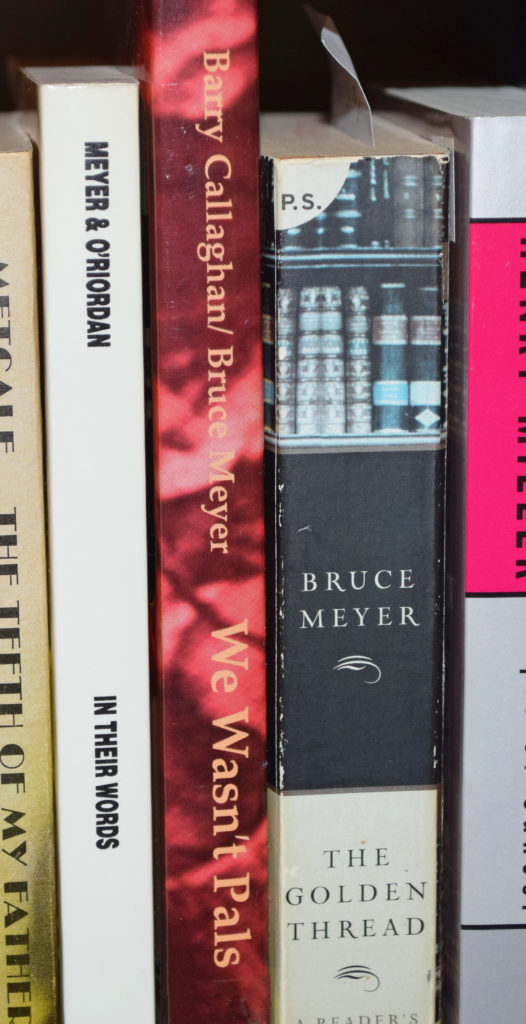
Also in The Golden Thread you “point to The Aeneid as the source for idealistic charisma that swept John F. Kennedy into office.” Then you note that Bill Clinton “failed to deliver the promise of Aeneas, the concept in which leaders put the nation first and their own private concerns second.” While reading that chapter, I couldn’t help wonder how you might contrast the current occupant of the White House with Aeneas.
I have a poem, a French form ballade, “Galaxy” in Mesopotamia [Scrivener Press, 2009]. It is about growing up with the idealized President (who, we found out later, was less than ideal, but just the same I feel the world is missing out on the concept of the wise, compassionate leader). Obama was, to me, someone who came close. He has a brilliant mind. I’ve seen it in action so many times. His command of facts, his underlying assertions of the need for world affairs to be human affairs, are the hallmarks of the Arthurian ideal, an ideal manifested in the character of Galahad from The Quest of the Holy Grail. What do we have now? I will not dignify the Minotaur with language.
For those not familiar, your book The Golden Thread shows the connections between the great works of literature, such as The Odyssey and Dante’s Inferno, and examines the imprint they’ve left on subsequent writers. If you were to expand The Golden Thread to include Canadian content, what book (or books) would you include, and why?
Canadian literature has not yet been mapped. Noah Richler wrote me a furious letter when I said this in the Globe and Mail. He misunderstood what I meant by “map.” There is a cosmology, a system of structure, theme, and image to any body of literature. It is not a literal map. I’m not interested in saying this person lives here or there. That has been the big mistake in our reading of Canadian literature. We are not geography. We’ve been told geography is everything, but there are far more unexplored factors in Canadian literature.
We’re an immature literature because we have not mastered the art of expressing tragedy within our context. We have failed to recognize that our literature shifted from an external vision to an internal vision when Margaret Laurence published The Diviners in 1974 or Timothy Findley The Wars in 1977, or Michael Ondaatje The English Patient in 1992. We haven’t stood back and examined Canadian literature from arm’s length. Our critics talk about specific works or specific authors.
One of these days, if I still have a publisher left, I want to write a Golden Thread for Canadian literature. Why did our trench literature go missing? What was it about us that impelled E.K. Brown (Frye’s teacher and the teacher of A.J.M. Smith and Roy Daniels to declare nothing of worth was written during the First World War? Heck, I found 50 trench authors [We Wasn’t Pals, Exile Editions, 2001 & 2014]. The writing is there. We said “no” to those authors because we embraced our illusions of what poetry and literature should be in the 1920s. We weren’t up for the language of horrific reality. Why? Because the way literature is discussed in Canada is juvenile. If we are to become a mature literature, we have to elevate our level of criticism and look at the whole picture, not the regional picture, but the reasons why we write what we write.
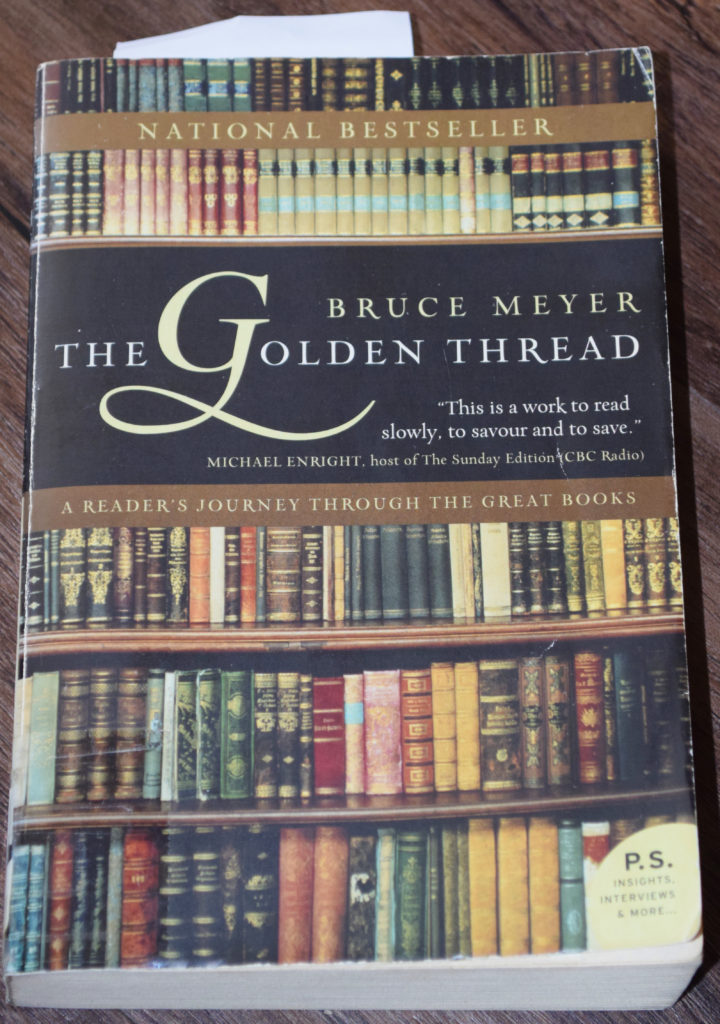
I think James Reaney was on to something when he made attempts to connect Wacousta to Paradise Lost and the Gothic conventions, but he could never explain why. I think I know why. The problem is, however, that our literature is still very much a matter that is decided by agents and people at cocktail parties, and an astute critic has to get beyond all that with a terrible dispassion and a profound sense of objectivity.
It would also help if we actually read our literature, but, alas, most Canadian literature is bound to the rock of conversation where its liver is gnawed by a giant eagle — something Earle Birney, a mentor of mine, pointed out in his poem “Vancouver Lights.” I believe we will eventually break our chains, but our literature is going to take a lot of sorting out before we can arrive at a place where it engages sensible discussion and not Caesar’s thumb reviews in shrinking book review sections.
I don’t know what the future will be like, but I know people will be concerned with love, family, moments of sublime surprise and discovery, and loss.”
I’ll close the interview with Bruce’s final words to me:
. . . you have every right to view my unrestrained responses as the blather of a crackpot. Many do.
I hope you’ll see that I walk around with as much of a sum of literature in toto as I can cram into my head; and there really is a beautiful structure to the human imagination and the longer I think about it the more I see the elegance and architecture of it. Our imaginations are wonderful things.
“Just write the next one” is a philosophy that has served Bruce Meyer well. Here’s a list of obstacles to publication Bruce has overcome – including several “ghost books” accepted for publication before they met an unexpected fate.
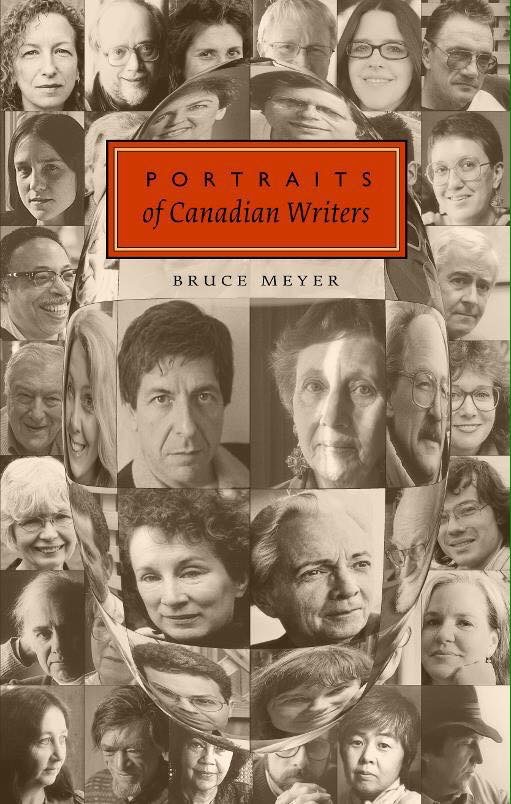
- His first manuscript was rejected more than 1000 times
- One book was accepted then withdrawn when the publisher insisted on owning the copyright to the work
- One book was accepted but the publisher went out of business before the book was released
- Flights was burned in the publisher’s backyard following a dispute
- The Presence was printed, then the entire shipment got left on a loading dock and buried in snow until spring
- Heroes had the wrong ISBN printed in the publisher’s catalogue making the book impossible to order or purchase
